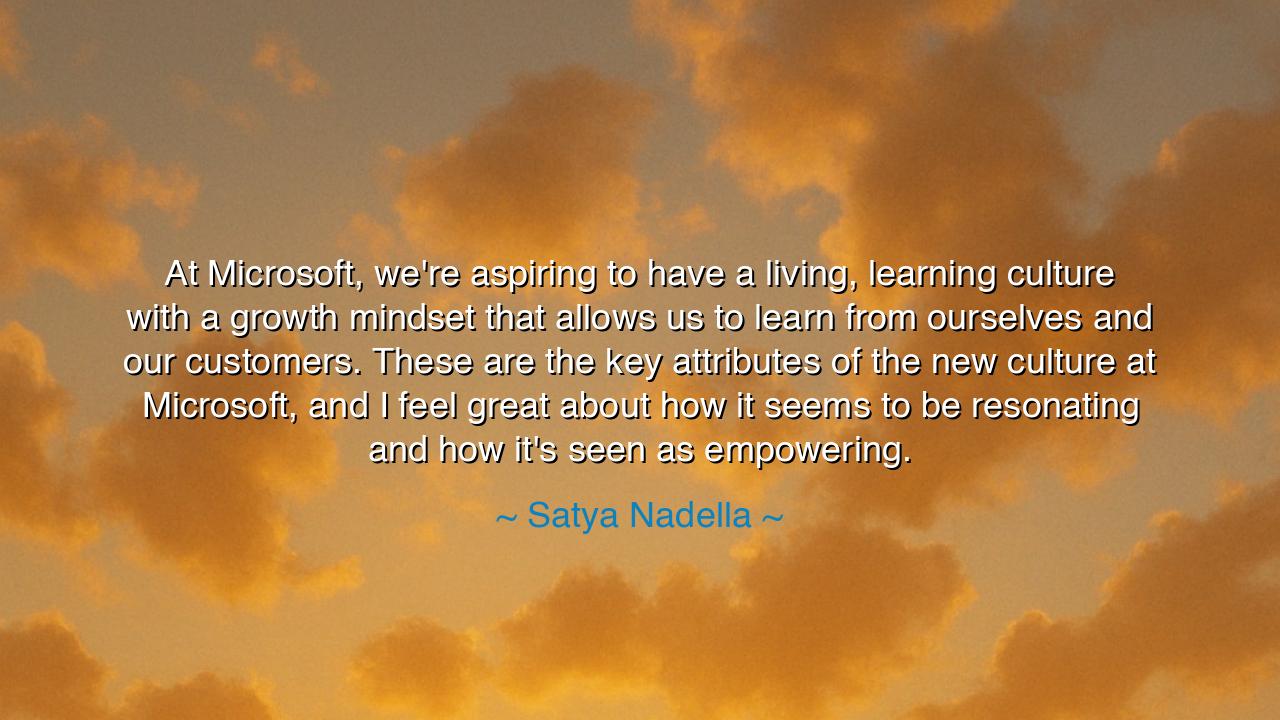
At Microsoft, we're aspiring to have a living, learning culture
At Microsoft, we're aspiring to have a living, learning culture with a growth mindset that allows us to learn from ourselves and our customers. These are the key attributes of the new culture at Microsoft, and I feel great about how it seems to be resonating and how it's seen as empowering.






There are leaders who rule by command, and there are leaders who guide by vision. In the words of Satya Nadella, “At Microsoft, we're aspiring to have a living, learning culture with a growth mindset that allows us to learn from ourselves and our customers. These are the key attributes of the new culture at Microsoft, and I feel great about how it seems to be resonating and how it's seen as empowering.” These are not the words of a conqueror, but of a cultivator — one who understands that the strength of an empire lies not in its walls or wealth, but in the minds and hearts of its people. Nadella speaks here of something far greater than corporate reform: he speaks of the eternal law of renewal — the power of learning, humility, and growth to transform any civilization, whether of machines or of men.
When Nadella became the steward of Microsoft’s vast realm, the company had grown powerful but weary, trapped by its own success. It had forgotten, perhaps, that even the mightiest tree must keep reaching toward the sun or risk decay. And so Nadella, like a wise gardener, sought to restore the soil of the company’s soul. He planted the seeds of what he called a growth mindset — a belief that intelligence and talent are not fixed, but can be cultivated through curiosity and perseverance. It was a philosophy drawn not from arrogance, but from humility — the understanding that even the great can learn anew. In doing so, he breathed life back into a culture that had grown rigid, reminding it that the truest strength lies in flexibility, and the truest wisdom in the willingness to listen.
This idea of a living, learning culture is as ancient as it is modern. The Greeks called it paideia, the continual education of the soul. The monks of the Middle Ages called it studium, the devotion to lifelong study. Even the samurai of Japan believed that mastery was not a state but a path — that to stop learning was to die. Nadella’s teaching is a reflection of that timeless wisdom: a community, like a person, must remain alive through learning, must adapt, evolve, and respond to the changing winds of time. For when the spirit of inquiry fades, decline soon follows.
We can find the same spirit in the story of Alexander the Great and his teacher Aristotle. Though Alexander conquered nations, he never ceased to seek wisdom. He carried Aristotle’s lessons with him into battle, knowing that knowledge was the truest weapon. It was not brute force that made his empire endure in memory, but the ideals he spread — the pursuit of truth, the blending of cultures, the hunger to learn from others. So too does Nadella’s vision call upon his people to be students as well as builders, to learn not only from success but from customers, competitors, and mistakes. In this way, he has turned a company once guarded by pride into one guided by curiosity.
The growth mindset, as Nadella describes it, is more than a strategy — it is a spiritual posture. It requires humility to admit one does not yet know, and courage to keep reaching for greater understanding. It invites failure, not as shame, but as teacher. It transforms the workplace from a battlefield of egos into a sanctuary of collaboration. Under such a mindset, every error becomes a lesson, every challenge an invitation to rise higher. The company, like the human soul, becomes a living organism — not static, but growing, breathing, ever-learning.
The resonance Nadella speaks of — the way his message is “empowering” — comes from this liberation of the human spirit. When people are trusted to learn, they awaken. When they are encouraged to grow, they innovate. When they are invited to share, they unite. The leader’s role, then, is not to dictate, but to ignite — to set aflame the inner curiosity of each individual so that the whole may shine brighter. In this, Nadella joins the lineage of those who have understood that leadership is not dominion, but cultivation.
Let this teaching be taken beyond the walls of Microsoft, into every home, every craft, every generation. To live well is to keep learning. To lead well is to help others do the same. Whether you are a builder of cities or of dreams, remember this: stagnation is death, but curiosity is eternal life. Be as Nadella urged his people to be — humble, teachable, ever-growing. Seek wisdom in every experience, and share what you learn with grace. For in a world that changes faster than the wind, only the living, learning mind shall endure — and in its growth, humanity shall find its truest power.






AAdministratorAdministrator
Welcome, honored guests. Please leave a comment, we will respond soon